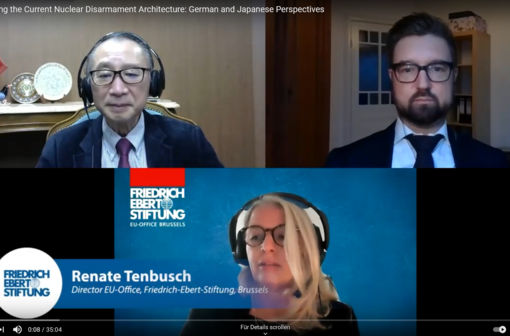On February 14, 2024, IFSH hosted a one-day workshop in Hamburg’s representation in Berlin titled "Re-Thinking the Future of Peace and Security in the Baltic Sea Region – Avenues for Research and Policy". The workshop brought together scholars and analysts from universities, research institutions, and think tanks from around the Baltic Sea to discuss current peace and security dynamics in the Baltic Sea region and to draw conclusions for future research and policy on the issue.
From Russia’s war of aggression to transnational security threats
On a first roundtable, the workshop discussed the repercussions of Russia’s war of aggression against Ukraine on peace and security in the Baltic Sea region. It explored policy implications from the perspectives of Baltic and the Nordic countries, and delved into the roles of regional security organizations like NATO, EU, and OSCE. The roundtable highlighted the need for a clear understanding of 'cooperation' with or without Russia for maintaining peace and security in the Baltic Sea Region.
A second roundtable shifted focus to the relevance of transnational security threats and their global entanglements, emphasizing the interconnectedness of policy fields, such as energy, climate, and security. The roundtable highlighted linkages between traditional military threats and vulnerabilities caused by these transnational security risks and discussed how functioning peace and security orders can be established on regional and global levels.
Avenues for future research and policy on the Baltic Sea region
The workshop identified several topics for future collaboration. Building on the premise that the Baltic Sea region is one of Europe’s key regions, Russia’s war of aggression against Ukraine remains a pivotal issue for the future of peace and security in Europe and the Baltic Sea region. How, if at all, cooperation during and after war functions, was a central issue of workshop debates. Discussions arose about designing pathways to achieving sustainable peace in Europe and Ukraine’s role within it. The workshop also emphasized that the current “polycrisis” with its coalescence of new and unpredictable risks and their cascading effects has implications such as the increasing inadequacy of silo thinking in policy responses addressing them.
Two dinner speeches concluded the workshop. Ambassador Florian Raunig, Permanent Representative of Austria to the OSCE, discussed in private capacity the future of European peace and security in times of war. In his speech, Ambassador Raunig identified key security challenges for Europe and possible responses in short-, medium- and long-term perspectives. Professor Fabrizio Tassinari, Executive Director of the Florence School of Transnational Governance at the European University Institute, discussed the preeminent role of the Baltic Sea region for the future of European peace and security by looking at conditions for successful regional integration around the Baltic Sea, ongoing geopolitical dynamics, and processes of regional reordering. He emphasized the need to identify European responses to Russia’s war of aggression against Ukraine for any future peaceful and prosperous development in the Baltic Sea region.
The workshop was jointly organised with the Senate Chancellery of the Free and Hanseatic City of Hamburg and the Hamburg Ministry for Science, Research, Equalities, and Districts and funded within the framework of the Baltic Science Network under the roof of Policy Area Education of the EU Strategy for the Baltic Sea Region.




